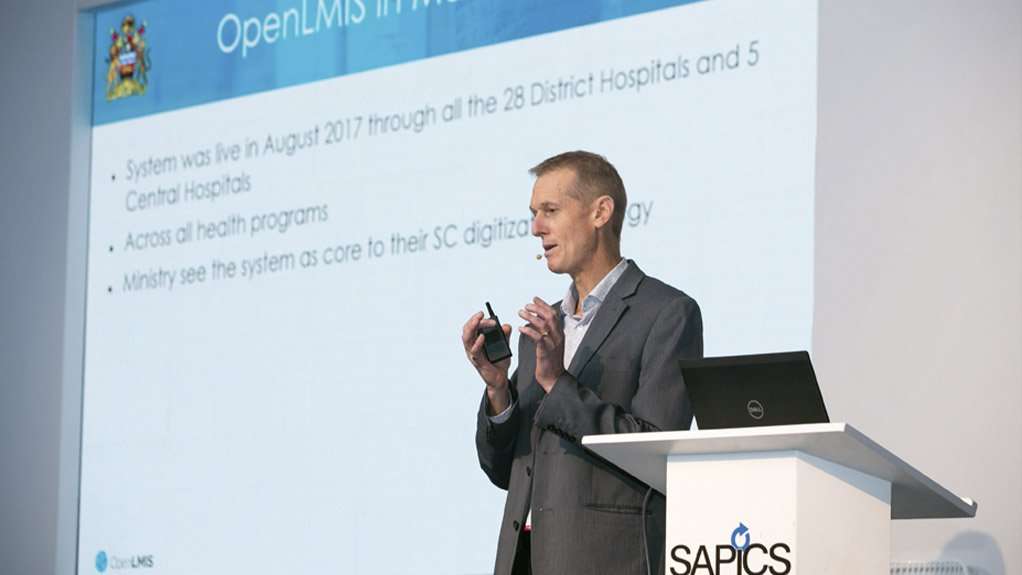Healthcare in developing African countries is being jeopardised because pharmacists must often take on the job of supply chain planning, including understanding minimum order quantities, demand signals and planning, and inventory management. Having to take on these responsibilities as well as their duties as a pharmacist who must get the right medicines out to patients in need, can result in write-offs and life-threatening shortages.
At the 2022 SAPICS Conference, Vitalliance general manager David Crewe-Brown, highlighted the challenges in the public health supply chain in Africa. He also shared inspiring case studies from Malawi and Rwanda, where technology solutions are solving some of the problems, assisting and upskilling pharmacists, driving supply chain maturity, and improving healthcare.
“Challenges in the public health supply chains in Africa include manual processes, poor data, a lack of visibility, unintegrated systems, limited supply chain skills, different agencies, and limited funds,” Crewe-Brown told SAPICS delegates. He cited Amazon as an example of a supply chain hero. “Amazon is worth USD1.2 trillion. It delivers 1.6 million packages a day. It achieved this by investing in the right supply chain processes, skills and technology,” he stated.
In Malawi, OpenLMIS Implementing Partners partnered with the Ministry of Health to implement an OpenLMIS software solution to manage requisitions, order fulfillment, stock and inventory management, analytics and reporting, mobile integration and equipment, including cold chain equipment.
The technology implementation resulted in improved data availability and visibility for decision-making, Crewe-Brown said. “It made replenishment ordering easy and accurate, taking budget considerations into account. The time for an order to be processed was reduced.”
Very importantly, the system simplified the work in the pharmacy, he stressed. “It improved skills and capabilities, as well as medicine availability. Write-offs were reduced,” he added.
Crewe-Brown revealed that a One Network implementation for the Rwandan Ministry of Health replaced the previous paper-based and manual driven system with a powerful technology solution designed to serve the country’s 11.78 million population. He explained to SAPICS delegates that it meets the needs of 900 local health clinics and dispensing facilities, more than 40 distribution centres and four in-country warehouses, which are responsible for approximately 3 000 SKUs (stock keeping units).
“This technology implementation has resulted in improved patient service levels, reduced costs and increased operational efficiencies. In-stocks have also been improved at district pharmacies and health clinics, wastage has been reduced, and the cost to deploy, maintain and support the system is lower,” he stated.
Crewe-Brown advised SAPICS delegates that the process to accelerate supply chain maturity and move from zero to supply chain hero starts with leadership. “Set the vision and map out the strategic direction,” he recommended. “The process to be established must be standardised. People development and getting the right teams in place is critical. Change management will ensure buy-in and support,” he expanded.
He emphasised the importance of the right tools, and selecting these at the right time, with a migration path to using more advanced tools as the process matures. “Data availability, accuracy and visibility are also crucial. There must be a single version of the truth. A continuous improvement mindset and culture is necessary,” he stressed.
Crewe-Brown reminded SAPICS delegates that supply chain improvement is a journey.
This year’s 44th annual SAPICS Conference was the first in-person gathering of the African supply chain community since the start of the COVID-19 pandemic. The milestone event saw 600 supply chain professionals worldwide gather in Cape Town. The learning and collaboration that the event enabled was critical at a time when the supply chain profession is facing unprecedented challenges in an increasingly volatile environment, according to organiser SAPICS, The Professional Body for Supply Chain Management.



